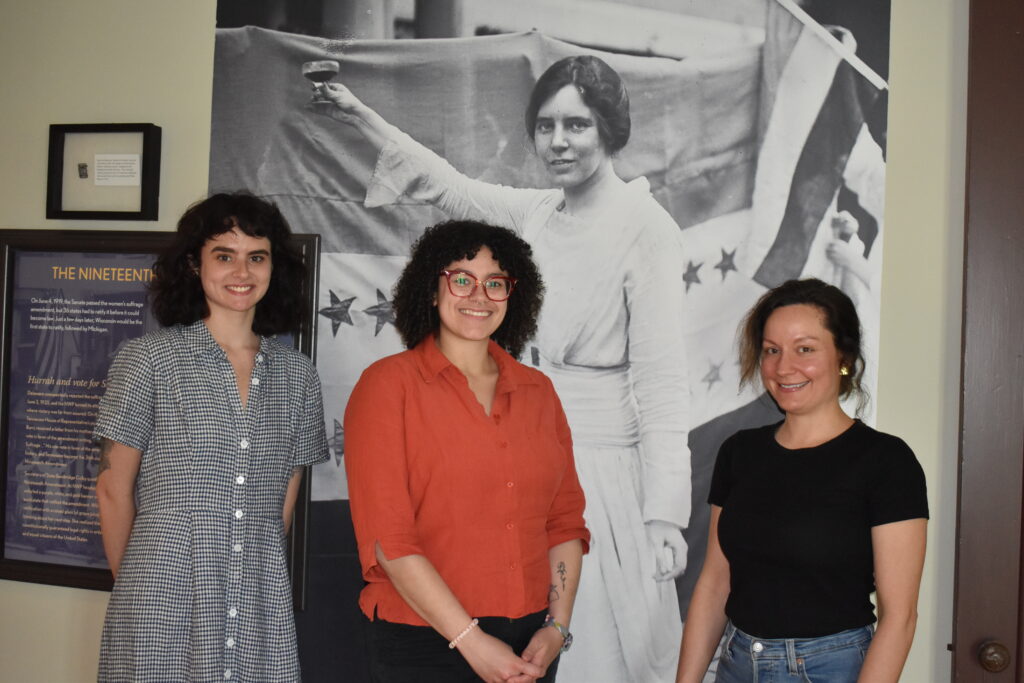
Alice Paul first went on hunger strike in 1909 at the Halloway jail in England while serving a seven-month sentence for advocating a woman’s right to vote during the Lord Mayor’s banquet in London.
She refused to wear prison clothes.
“The suffrage movement in England was more militant and radical than in the United States,” said Rachael Glashan Rupisan, executive director of the Alice Paul Institute at Paulsdale, the Paul family home in Mount Laurel. “She met fellow American Lucy Burns in jail there.”
After graduating from Swathmore College and earning a master of arts degree from Columbia University in 1907, Paul went to England to study social work. There she met British suffragettes, including Emmeline Pankhurst and Emily Davison, and learned their tactics.
Paul ended up serving three jail terms in London for participating in various protests, before returning to America and earning a doctorate from the University of Pennsylvania in 1910. When asked about the suffrage movement in America after being in London, Paul responded, “What movement?” according to Rupisan.
She and seven members of the institute’s Girls Leadership Council traveled to New York City on April 25 to see “Suffs,” a Broadway musical based on the suffrage movement.
“I really loved it,” Rupisan noted. “I’m passionate about the arts and history. They are huge tools able to affect positive change. The play teaches us to keep marching in the fight for social justice and keep doing it for the next generation.”
The musical is told from the perspective of Paul and focuses on the 19th amendment, passed in 1919 and put in effect the following year. Rupisan explained that English women did not get that right until 1928.
Yet both movements were very active early in the 20th century.
Emily Davison – in front of the world press at England’s 1913 Epsom Derby – jumped in front of King George V’s horse, Anmer, who was galloping at full force. She never regained consciousness and died that day a martyr in the eyes of suffragettes.
Meanwhile, three months earlier in America and borrowing ideas from her British friends, Paul and the newly formed National Woman’s Party (NWP) organized parades and pickets. Her first one was in Washington, D.C., on March 3, 1913, the day before President-elect Woodrow Wilson’s inauguration.
According to newspaper accounts, about 8,000 women marched with banners and floats down Pennsylvania Avenue from the Capitol to the White House, while a half million spectators watched, supported and/or harassed the marchers.
Keeping up the pressure, Paul and other suffragists met on March 17 with Wilson, who told them it was not yet time for an amendment to the Constitution. Paul and Burns had joined the National American Woman Suffrage Association in 1912, but they and others split with that group to form the NWP and focus on lobbying Congress for an amendment.
Paul and more than 1,000 suffragists known as the Silent Sentinels began 18 months of picketing in January of 1917 in front of the White House. One of the signs they displayed asked, “Mr. President, how long must women wait for liberty?”
“The organizers and dozens of women were jailed,” Rupisan noted. “Alice Paul went on a hunger strike and stayed on it until they were all released.”
Doctors threatened to send Paul to an insane asylum and force fed her, while newspaper accounts of her treatment garnered public sympathy and support for the women. By 1918, Wilson had announced his support for an amendment that would give women the vote, but it took another year for Congress and the required 36 states to approve it. The amendement was finally ratified in 1920.
“She traveled a lot to convince state legislatures to ratify the amendment,” Rupisan pointed out, explaining that the musical depicts Paul’s hunger strike, but has her giving in and eating for the cause.
“In fact,” Rupisan emphasized, “she didn’t give in.”
“Suffs” has been nominated for six Tony awards, including best musical.
“The play was great,” said Kyla Spencer, operations manager of the Alice Paul Institute. “I studied theater in college and I really enjoyed it.”
“I had never seen a play on Broadway – it was awesome,” said Molly Gonzales, advocacy manager at the institute.
“It was a special evening for the seven high school seniors in the Girls Leadership Council,” said Rupisan of the group, who got to meet 90-year-old feminist Gloria Steinem after the show. “They were so excited to talk to her and Gloria was just as excited to see them.”
And so the baton for women’s rights was passed on to the next generation, as it has been since the days of Susan B. Anthony in the 19th century.
“Alice Paul grew up here on the farm and returned when she needed a rest,” stated Rupisan, who joined the institute as the development director in 2019 and has been the executive director for nearly 20 years.
She looks forward to the Alice Paul Institute’s 40th anniversary gala on Sept. 26 at the National Constitution Center in Philadelphia. For information, go to alicepaul.org.
Rupisan observed that the institute – and the 60 local high-school students in the council – will “keep marching” and address current issues such as getting the Equal Rights Amendment finally ratified to guarantee pay and reproductive equity for women and all people.
Paul died at the Greenleaf Nursing Home in Moorestown in 1977. She was 92.









